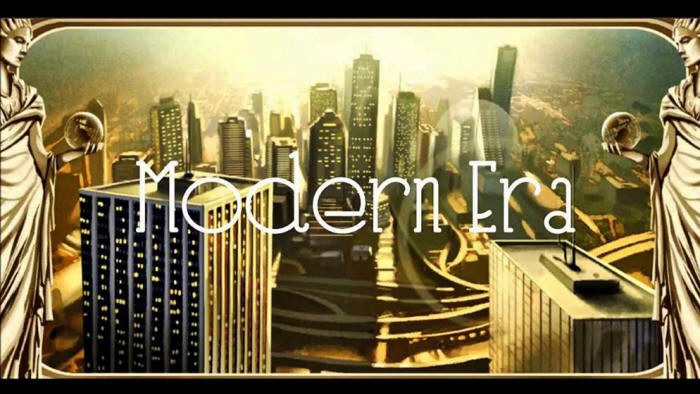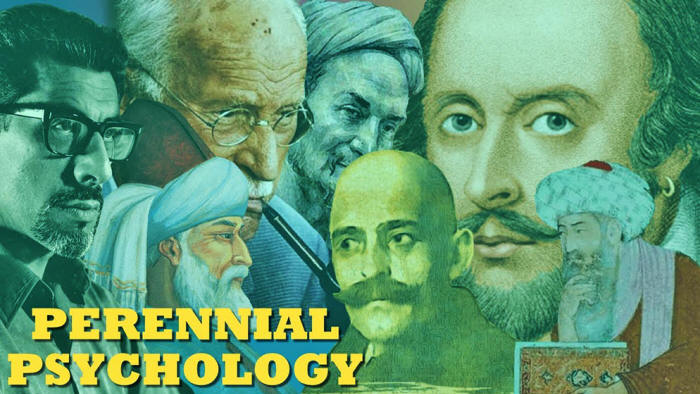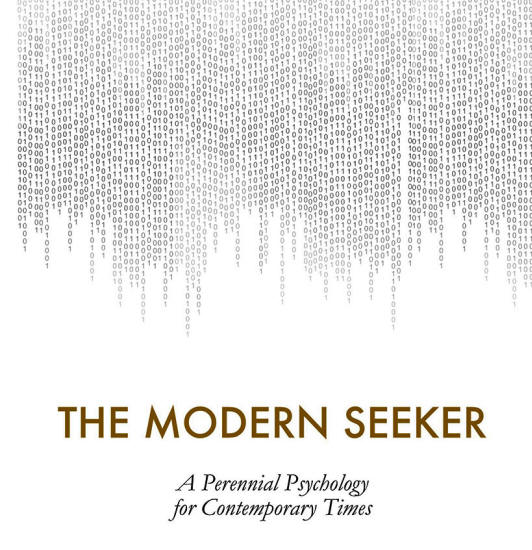|

by Kingsley L. Dennis
December 07, 2024
from
KingsleyLDennis Website
Spanish version

Every age, every epoch, has its thinking patterns and modes of
behavior.
Each age considers its knowledge to be
superior to what has gone before.
In each age, people are under the effect of
the incumbent conditioning and the mass emotions.
It is not easy to detach from these influences,
and the majority of people live their lives in obedience to them.
It is useful in each age to be aware of those
influences which are dominant and that are utilized to popular
effect.
The Perennial Psychology takes into
account these dominant operative forces and functions in the
knowledge of their presence and their likely impacts.
The modern seeker in the world of today
likewise needs to have a keen awareness of these foremost impacts
and forces.
Within each era,
there are thought models or narratives that are
popular.
Often, they come as part of the social programming of each
given epoch.
That is, each era cultivates certain sets and
parameters of thinking which are promoted and protected.
These then filter down to influence how people's
perceptions, beliefs, and thinking patterns are formed.
People may have the 'belief' that they have "free
will," when this is in fact,
a delusion based on a perceived liberty
of behavior...
Just as software programs the parameters and goal
definitions of a machine, so does social conditioning program a set
of codes into people and their cultures.
Once these codes are known it can become fairly
easy to predict the attitudes and behavior of large groups of
people.
In general, humanity is much less individualized than its
members believe themselves to be.
The following tale illustrates how each epoch has
its way of thinking.
It is called 'Three Epochs':
-
Conversation in the 5th century
"It is said that silk is spun by insects
and does not grow on trees. And diamonds are hatched from
eggs, I suppose? Pay no attention to such an obvious lie."
"But there are surely many wonders in remote islands?"
"It
is this very craving for the abnormal which produces
fantastic invention."
"Yes, I suppose it is obvious when you
think about it - that such things are all very well for the
East, but could never take root in our logical and civilized
society."
-
In the 6th century
"A man has come from the East, bringing
some small live grubs."
"Undoubtedly a charlatan of some
kind, I suppose he says that they can cure toothache?"
"No,
rather more amusing. He says that they can 'spin silk.' He
has brought them with terrible sufferings, from one Court to
another, having obtained them at the risk of his very life."
"This fellow has merely decided to exploit a superstition
which was old in my great-grandfather's time."
"What shall
we do with him, my Lord?"
"Throw his infernal grubs into the
fire, and beat him for his pains until he recants. These
fellows are wondrously bold. They need showing that we're
not all ignorant peasants here, willing to listen to any
wanderer from the East."
-
In the 20th century
"You say that there is something in the
East which we have not yet discovered here in the West?
Everyone has been saying that for thousands of years.
But in
this century, we'll try anything: our minds are not closed.
Now give me a demonstration.
You have fifteen minutes before
my next appointment.
If you prefer to write it down, here's
a half sheet of paper." 1
We live in a modern age of great distraction as
well as incredible promise...
There is little doubt that these are indeed
testing times. They are testing in regard to grasping what it fully
means to be a human being - to be living a life as a conscious,
human being.
People are blinded to the many creative
possibilities and capacities inherent within them. These capacities
are dulled by a restrictive social and cultural environment that has
become increasingly institutionalized and managed.
Living in a modern world places upon the individual other
responsibilities.
In part, these responsibilities have to do with
finding a sense of one's self, and for one's inner life to develop
in harmony with external demands.
The individual requires a certain amount of
independence in order to freely have self-expression.
The suppression of self-expression, which is
dominant in many cultures, often leads to dependency upon external
institutions as well as certain indulgences, such as consumerism or
distracting pursuits...
These are often a way of escaping anxiety or
depression which are emotional and mental responses to the
suppression of a person's inner self.
Many people have a sense that their creative
capacities are underused, or that they are not given opportunities
for full self-expression.
The push toward further automated
lifestyles, which is predominant in modern industrialized nations,
is not conducive to the full self-expression of one's inner life.
Within this environment, a person is compelled to
find the necessary conditions that can allow them to be receptive to
a developmental path. These are some of the obstacles that face a
modern seeker in the world today.
It is imperative that any person seeking a developmental path have a
deep sense of self-worth. Otherwise, it may be the case that what
they are seeking is a substitute for their own lack of self-worth.
This state is not only non-conducive to any real
learning path but is detrimental to interior growth.
Life in the modern era is accustomed to providing
for a sense of lack.
Modern societies promote the feeling or sense
of lack in order to be able to provide a customized, consumptive
lifestyle as a means of compensation.
The sense of lacking self-worth leads to
unhealthy behavior and must be avoided at all costs.
Self-worth is
the individual's own measuring stick and can guide through the
uncertainties that both life and the inner path throws up.
At times, one's own self-worth is the only thing
that lights the way forward.
It must be nourished and cherished, and
others forbidden from attempting to diminish it or take it away.
Although the modern era is characterized by mass communications and
connections, there is a considerable absence in
the concept of
service.
Within most societies, there is a lack in the understanding
of service as a greater good.
Service is often provided in terms of commercial
care or paid assistance, yet not in human heart-centered
interactions.
The Perennial Tradition stresses that human
service is a fundamental part of the path.
What the aspirants seeks
for themselves must be found through what they can give back, both
as an individual as well as part of the bigger picture.
The developmental path is a reciprocal process,
and Perennial Psychology has deep knowledge about what genuine
universal service requires.
Genuine service is only possible when a person has become
individualized; that is, operating from the essential self rather
than from cultural norms and expectations.
Each culture has its own
values on what it deems to be service.
For example, acting out of a desire to feel
generous or worthy is not true service as the person is
participating in the hope of reward, in this case, to receive a
sense of self-worth.
A person must already have a balanced degree
of self-worth in order to move ahead on a path of development.
To move ahead by gaining emotional rewards upon
the way will prove more detrimental than beneficial.
Unfortunately, most modern cultures, in the
western hemisphere at least, place high value and esteem upon such
acts that generate emotional gratitude and social inclusion.
In fact, there are many award ceremonies and
glamorized spectacles that praise such 'socially worthy' actions.
To any serious aspirant and seeker, these are but
distractions upon the path.
The Perennial Psychology rather views
'invisible service' as being the correct path.
One formulation of the function of service has been named as
adab.
This term has been used in the past to represent
a code of conduct within some circles. The original root meaning of
the term adab means 'to prepare a banquet; to invite to a
meal.'
It's more general and cultural meanings have come to
represent,
politeness, courtesy, good manners, respect, correct
behavior, proper conduct, discipline, and service.
Adab is,
courtesy, respect, and
appropriateness.
It is not formality but a code of conduct - of
being - that adheres to the specific context in which a person
operates.
As it states, it is a respectful appropriateness.
This implies that the individual is fully aware of their cultural
surroundings and adjusts their conduct to apply to the situation.
This could be,
-
in terms of relationship between
friends
-
in relation to family members
-
in relation to the society
and cultural milieu, etc.
In some quarters, it has been referred to
as 'beautiful action.'
There are many varied aspects to the concept of adab - conduct upon
the Path - and they act as important guidelines to the seeker in any
age.
Such conduct,
is timeless, and is essential regardless of time,
place, and culture.
Some of these aspects may be described as the
following:
-
To make one's practices inwardly sincere,
rather than outwardly apparent.
-
To recognize one's own faults, rather
than finding faults with others.
-
To recognize one's own ego and to
struggle against its overt manifestation by remembering that
our greatest ally is Love.
-
To limit one's preoccupation, worry,
vanity and ambition over the world and the worldly.
-
To seek to heal any wrong that may have
been caused to another, and to correct any misunderstanding
as soon as possible.
-
To remember that no good will come out of
the expression of anger or excessive amusement.
-
To be patient with difficulties.
-
To recognize and remember that all people
are members of the same family.
-
To avoid gossip and bad-mouthing.
-
To be indifferent to favor or benefit
for oneself.
-
To show responsibility for receiving what is
one's due.
-
To be free of envy and ambition,
including the desires to lead or instruct others.
-
To do what one does in terms of genuine
service - not for the desire for reward or the fear of
punishment.
The Perennial Psychology is a system of great
compassion, although seldom recognized for being so.
This is because it does not engage in outward
show, or cultural forms of what are considered to be compassion or
'compassionate acts.'
In general assessment,
compassion is seen as
sympathizing for the suffering of others.
It is regarded as showing
concern for the physical, emotional, and mental state of others and
to act for their well-being.
Compassion is therefore something that is shown
- it is expressed and can be recognized as a virtue by observers.

The Perennial Psychology functions in recognition
of the well-being of others although does not necessarily express or
manifest this publicly or in ways commonly recognized.
This is partly because emotions are greatly
manipulated within external environments.
Societies and cultures
have shown misplaced emphasis upon the evaluation, and conditioning,
of various emotional behavior and responses.
Also, that to engage in culturally sanctioned
modes of compassion, which may attract praise and recognition, can
prove detrimental to the inner development of the individual.
The modern age, with its global media communications and overt
commerciality and consumerism, specifically targets peoples'
emotional states.
Compassion has been exploited as another form to
gain financial advantage...
It must also be recognized that the perennial
perspective operates within a broader scope than most people can
realize, and its concerns are not only for the here and now.
The lens through which modern society evaluates
certain value sets is distinctly limited in terms of the perennial
perspective.
It would be advisable for the aspirant in today's world
to be aware of these subjective value sets and how they are utilized
(or manipulated) in various contexts.
The seeker will find it necessary to exercise great patience and
flexibility when dealing with the everyday obstacles and chaos that
life throws up.
Modern life is one of bombardment in terms of
impacts and stimuli.
The environment of the human senses has become
vastly crowded in recent years with an influx of electromagnetic
energy, electronic sounds and noise, as well as high levels of
deliberate misinformation and targeted messages.
In a world of mass
communication, we are constantly being told what we should want, or
believe, or that we need certain things...
The simple truth is that all people share a
similar longing, a similar hunger, as this next story shows.
It can be called 'The Story of the Grapes':
Four travelers - a Persian, a Turk, an Arab,
and a Greek - had agreed to travel together as companions for
some time in order to share the road.
They had spent the morning walking a great
distance and had arrived at a village feeling very hungry.
They
found that they only had a small amount of money between them
and had thus decided to use it to buy some food for them all.
This had started them arguing over what food
they should buy.
'I want to buy angur,' said the Persian.
'I want uzum,' said the Turk.
'We should buy inab,' said the Arab.
'No, we need to buy stafil,' said the Greek.
Another traveler who was passing by happened
to be a linguist and he said to them,
'Give me your money and I will be able to
buy food to satisfy all your desires.'
At first the group of four travelers were
distrustful of the new traveler, yet finally they agreed to let
him have their money to buy some food for them all.
The man went to a fruit shop and bought four
bunches of grapes which he returned to the group.
'This is my augur,' said the Persian.
'And this is what we call uzum,' said the Turk.
'You've brought me inab,' said the Arab.
'No, this is what we call stafil in my language,' said the
Greek.
The grapes were equally eaten between the four
travelers and they soon realized that their argument had been due
to their lack of understanding in the language of the others.
The travelers are like the ordinary person in the world.
The linguist is similar to a guide upon the
perennial path.
People recognize that they need something because of
an inner hunger, yet they often give different names to this
longing.
Yet despite the different names attributed to it,
it is the same thing.
It may be called different names by religious
institutions, or by philosophers or theorists.
However, it is only when a person of knowledge
appears (as in this case the linguist) that such hunger can be
provided for with the correct nourishment.
It can be said that
people do not fully know what they need. Or they are unable to
articulate their need due to a lack of self-knowledge or awareness.
Similarly, the Perennial Tradition is the wine made from the grapes.
This longing for grapes represents the initial
stage.
The wine is not yet offered until the earlier stage has been
absorbed and understood.
This wine is the fruit of wisdom.
The
grapes are the earlier need for knowledge.
Knowledge and wisdom are not the same, although
modern society often confuses the two together.
Likewise,
modern
life generally takes information to mean knowledge.
Again, these are
two distinct forms.
Contemporary society has little understanding of
wisdom.
Although the word is familiar, yet few people can grasp what
it really means.
The modern age has steered away from the concept
of essentialism.
It prefers to view things in terms of relativity.
Yet this shift into anti-essentialism is also a drift away from
seeking meaning. Modern life (or 'post-modern' life) has a plurality
of 'possible meanings' yet they lack depth.
The perennial path identifies an ultimate Truth
rather than a series of lesser truths that are relative. Because
this Truth must be experienced to be understood, it cannot be
adequately expressed in words.
The modern age places great faith and trust in words and language;
that is, in external expressions. This perspective has resulted in
the human mind developing to adapt to these strengths, whilst other
functions have become atrophied.
Any mechanism can only function for those uses it
has been prepared for.
This applies also for human cognition.
People
tend to take information and attempt to turn it into wisdom.
That is
partly why modern life is so bad at formulating the fundamental
questions about who we are, where we are going, and what is the
meaning of life.
To process these questions the modern mind seeks
to disentangle threads of information.
It is largely unprepared for
grasping insights of wisdom.
It is for this reason, amongst others,
that the modern seeker of truth will find themselves within the
minority.
This has always been the case.
The modern mind, to speak in general terms, has reached a functional
level of stability, which is in-keeping with the overall
stabilization of human societies.
Yet at the same time, the human
mind is underused in so many ways.
People have become accustomed, and largely
satisfied, to deal with information rather than pushing further
ahead to transmute this into knowledge and then wisdom.
These are
stages of a process and are not given or 'received' without due
diligence, effort, and conscious intent.
Within the last century, for example, there has
been a shift from having black and white televisions to receiving
broadcasts in color. Current technology now boasts high-definition,
plasma, and high-resolution pixel reproduction.
This shift can be
seen as an analogy with how human consciousness operates.
The television broadcast was only received
initially in black and white because of the lack of sensitivity of
the TV (our minds).
This black and white transmission may be equated
with information.
By developing the sensitivity and capacity of the
receiver (i.e., the human being), then the broadcast can be received
in full color - this may be called as knowledge.
To transmute this color definition into
'high-definition' requires an extra level of technology (i.e., a
'developmental technology'), which can be referred to as the
transformation of knowledge into wisdom.
The modern age tends to deal with this question of capacity by
activating two general responses:
-
to develop the intellect - this
also includes pushing the technological side
-
to play with
emotions and emotionalism
The effects of these strategies are that:
-
there is a vast increase in the accumulation of information and
data. This data collection lacks purpose and meaning
and further isolates human society
-
emotionalism becomes
further exploited and manipulated through media, propaganda, and
popular distractions.
Both these responses lack any understanding of purpose and meaning,
which is fast becoming a feature of the modern era.
This is one of
the reasons why the Perennial Psychology - as a modern expression of
the Perennial Tradition - is so important at this time.
There is a
great need for the developmental path to be operative within the
modern world.
The idea of gnosis (direct experience) and of
transcendence (inner development) have become discarded in recent
times in favor of materialism and material consumption.
The modern dominant paradigm is one that strives
to construct an artificial world that is self-enclosing - a reality
that has no place for the metaphysical or the intangible (the
non-material).
The dilemma for the seeker of today is that
modern life lacks awareness of the metaphysical.
Life has become
like a hall of mirrors, each reflecting a viewpoint, a perspective,
a hypothesis, that is vying for attention and control.
It could be said that the modern age has
attempted to excommunicate the presence of the esoteric, the
science of wisdom.
Yet the inner vision, the perennial Truth, can
never be extinguished - only eclipsed.
Now, within this barren
landscape, it may be that the Perennial Tradition is finding greater
need amongst people. The Perennial Psychology answers this need by
presenting the ancient science of wisdom in a context and language
appropriate for the times.
It can be stated that in each historical age, those working within
the Perennial Tradition have made knowledge of the developmental
path available to society in general.
This knowledge has served to assist social
advancement and cultural development, whether through institutions,
organizations, academies, or projects.
This is an example of how the practical use of
external systems and groupings can be utilized for the transmission
of higher knowledge.
At the same time,
the deeper wisdom has always
been made available to the few who showed the capacity to receive.
The modern seeker can find what they are
in need of within all times and places... if they know how to look...
In the modern age, there are new currents to attend to upon the
seeker's path...

References
-
Shah, Idries. 1995 -
The Magic Monastery - London: The Octagon Press, p25
|




